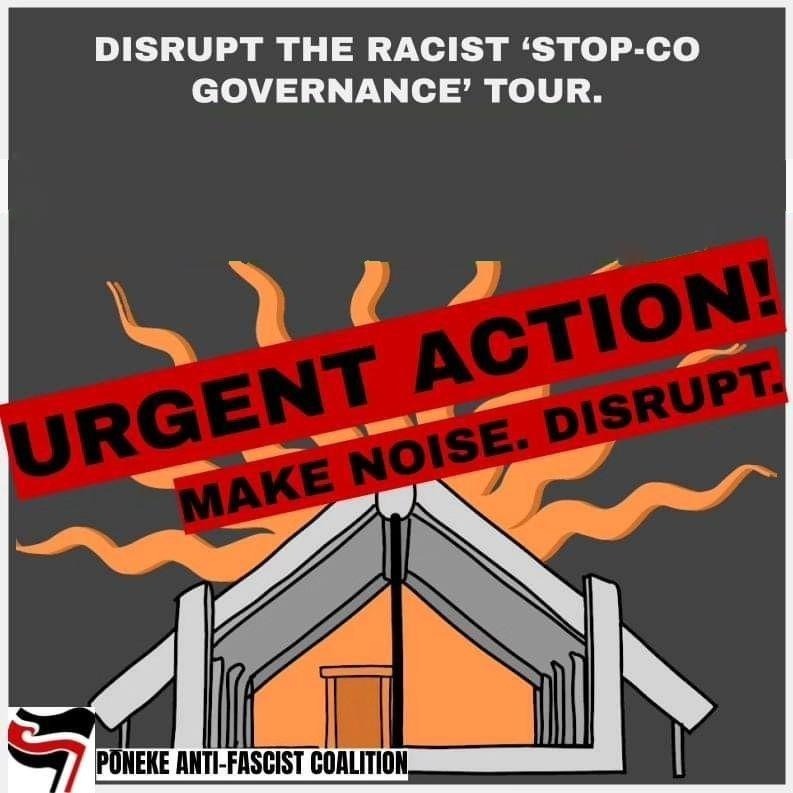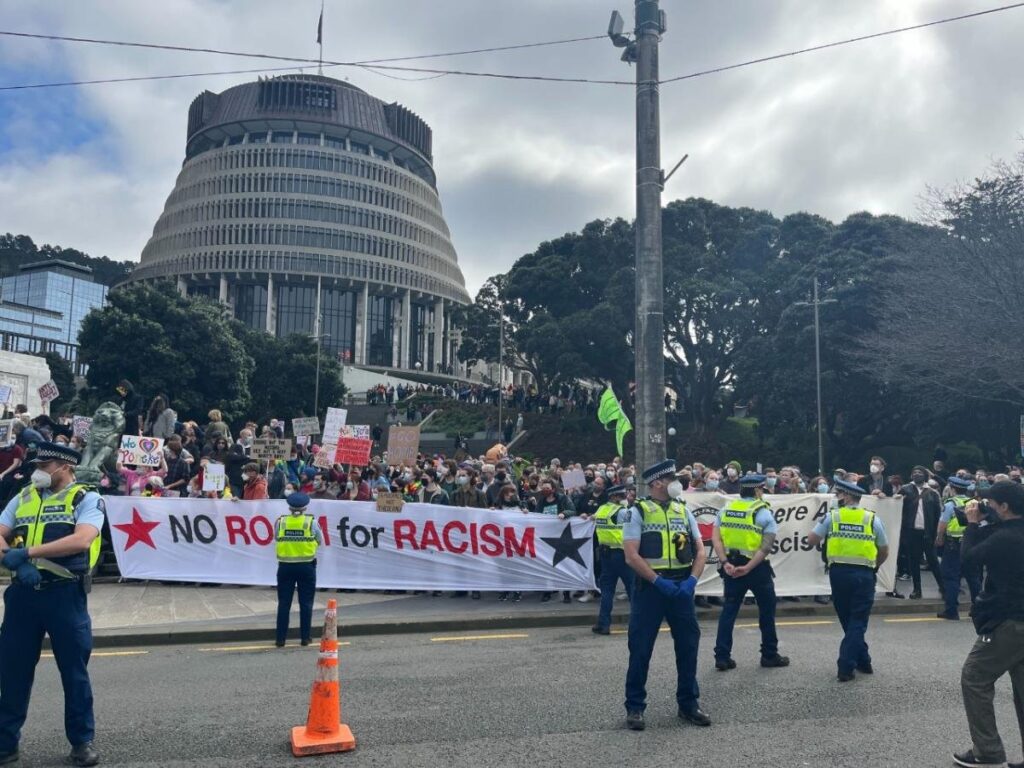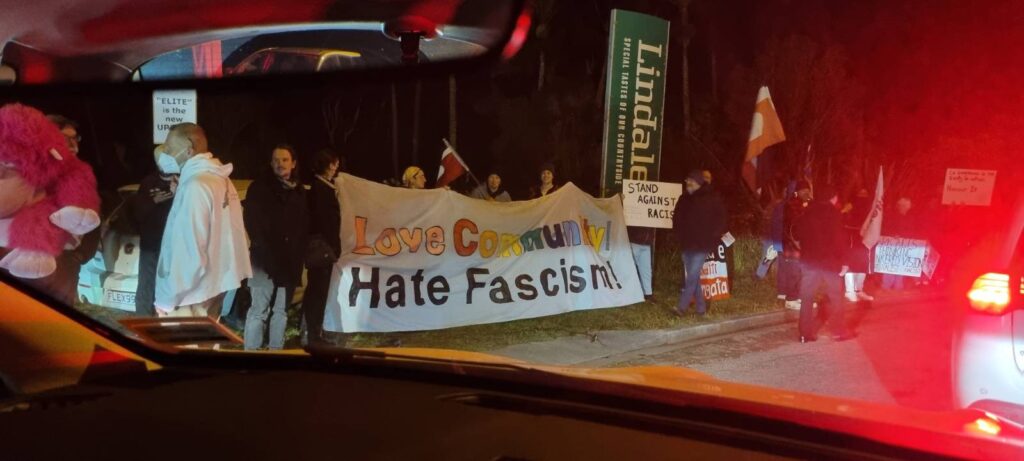Ironically, Antifa are using fascist methods to fight so-called fascism
author: Mark Freeman

As the 2020s culture wars ramp up in New Zealand, most of us will have seen noisy and chaotic scenes at recent events disrupted by protesters: the Posie Parker rally in Auckland, Julian Batchelor’s Stop Co-Governance meetings and marches led by Destiny Church leader Brian Tamaki.
The protesters are members of anti-fascist groups – Antifa for short. In New Zealand, they turn out in their dozens, sometimes hundreds, to protest what they see as dangerous speech against ethnic groups and other minority groups.

Antifa is controversial even amongst the political left: veteran American academic and activist Noam Chomsky describes Antifa as “generally self-destructive” and “a major gift to the right”. But who are these protesters, and what do they want?
Antifa is not so much a single organisation as a loosely affiliated movement of people with no chain of command who share information about “far-right activity” across regional and national borders.
The movement originated with militant leftists fighting fascists on the streets of Germany, Italy and Spain in the 1920s and 1930s. It had a resurgence in the 1970s, 1980s and 1990s when anti-racist punks in Britain and Germany mobilised against neo-Nazi skinheads in the music scene.
Antifa then migrated to the United States, where its popularity increased after Donald Trump became the president and in response to pro-Trump rallies. But Antifa’s activities in the United States have since extended to protesting at gatherings of socially conservative parents concerned about the exposure of their young children to inappropriate sexual content in books and LGBT content in schools. There have been allegations, including from Mr Trump, that Antifa groups have been funded by billionaire George Soros and his Open Society Foundations, but these claims are difficult to verify.
In New Zealand, an early 21st century anti-fascist group was Multicultural Aotearoa (MCA), formed in 2004 following racist attacks in Wellington. Two hundred members of MCA confronted the National Front at the Cenotaph near Parliament that year. They were described by police as a “radical, anarchist punk-rocker type group” who “really did cause most of the trouble”.
However, Antifa activism in New Zealand was a fringe activity until March 2019, when Brenton Tarrant massacred 51 people at two mosques in Christchurch. The shootings boosted the movement in this country as thousands of people marched against racist violence and the membership of antifascist groups dramatically increased. Three of the largest groups currently are Tamaki Anti-Fascist Coalition in Auckland, Poneke Anti-Fascist Coalition in Wellington and Antifascist Otautahi in Christchurch.
Tactics
Antifa employs a number of tactics, the more benign ones including creating websites, posting videos, and organising public events. Other, more confrontational, tactics are disruption, name-calling, “doxing”, property damage and violence.
Disruption, often involving chanting and shouting, is aimed at shutting down events. Name-calling of opponents is standard operating procedure. New Zealand anti-fascists have called Julian Batchelor a “fascist,” “racist trash” and a “far-right Christian fundamentalist”, Posie Parker a “white supremacist transphobe” and a “slug,” and Brian Tamaki a “Nazi collaborator”.

Another technique with more serious implications for individuals is “doxing”—publicly disclosing the identities of opponents. American historian Mark Bray says this is about “telling people that they have a Nazi living down the street, or telling employers that they’re employing white supremacists”. This technique, which includes trying to get their opponents fired from their jobs, has been used in New Zealand. I know of one person here who has been unjustly vilified as a white supremacist by one of the Antifa groups through the use of libellous posters and slanderous phone calls.
Antifa are implicated in violent clashes overseas. In this country, there were the well-documented incidents at the Posie Parker rally in Auckland in March this year, where an elderly woman was punched in the head by an anti-fascist protester and tomato juice was poured over Ms Parker’s head.
Countering “hate speech”
The motivation for Antifa’s attempts to shut down public events is to stop “fascism” by preventing “hate speech”.
Former US Antifa organiser Scott Crow says:
The idea in Antifa is that we go where they (right-wingers) go. That hate speech is not free speech. That if you are endangering people with what you say and the actions that are behind them, then you do not have the right to do that.
This idea of preventing so-called hate speech is echoed in New Zealand. A spokesperson for the Poneke Anti-Fascist Coalition told the crowd at this year’s Newtown Festival in Wellington what the group does and why:
We are confronting the fascists in the streets. Our grandparents fought the Nazis and today we fight against fascism and disinformation in our community every single day. We are pro-human, we are pro-earth, we are pro-people, we are pro-Maori and pro-diversity, pro-trans, pro-queer … We stand for love, for peace, for justice and for rangatiratanga te ao Maori… We don’t think that fascists should be allowed to spread their hateful ideas and divisiveness anywhere. We simply cannot afford to see the second rise of another fascist era. Millions and millions and millions of people died during the first fascist era … We have to stop fascism in our communities every single day, which is what we are doing right here, right now.
Few people would disagree with the laudable aim of countering fascism. But Antifa’s methods are problematic, to say the least.
For a start, their aggressive tactics make them susceptible to charges of hypocrisy. Their speech—in person and online—is vitriolic and at times dehumanises their opponents. If calling a fellow human being “racist trash,” a “slug” or “a Nazi collaborator” isn’t hate speech, then what is?
Another contradiction at the heart of Antifa is their attitude towards, and relationship with, authoritarianism, as highlighted by American political science professor Peter Beinart:
Antifa believes it is pursuing the opposite of authoritarianism. Many of its activists oppose the very notion of a centralized state. But in the name of protecting the vulnerable, antifascists have granted themselves the authority to decide which Americans may publicly assemble and which may not.
Not only are Antifa’s tactics problematic but so is their understanding of fascism itself.
Fascism is defined by Britannica Dictionary as “a way of organizing a society in which a government ruled by a dictator controls the lives of the people and in which people are not allowed to disagree with the government”. That definition sounds less like social conservatives trying to voice their concerns publicly and more like New Zealand’s former “single source of truth” prime minister restricting our freedom of speech, our freedom of movement and our right to bodily integrity under the pretext of a medical emergency.
The stifling-of-disagreement aspect of the definition is also highly consistent with the disruptive tactics of the anti-fascist groups. In other words, ironically, Antifa are using fascist methods in their fight against so-called fascism.
I admire the passion and dedication of Antifa activists to their cause. But the anti-fascists need to consider whether what they are fighting is actually fascism and whether their methods are reducing fascism or in fact promoting it.

Martin comments: With regards Freeman’s closing remark about passion and dedication, I apply the same comments that I apply to other activists who employ extreme and vindictive measures against both their opponents and the public who happen to be “in the way”: Useful Idiocy in action. There are better ways to protest and to get your point across. They could try studying their opposition’s methods for starters.

Get your copy from our Online Store or your local book and magazine retailer
Australian Retail Locations » Uncensored Publications Limited
New Zealand Retail Locations » Uncensored Publications Limited
As censorship heats up and free thought becomes an increasingly rare commodity, we appeal to our readers to support our efforts to reach people with information now being censored elsewhere. In the last few years, Uncensored has itself been censored, removed from the shelves of two of our biggest NZ retailers – Countdown Supermarkets and Whitcoulls Bookstores – accounting for 74% of our total NZ sales.
You can help keep the Free Press alive by subscribing and/or gifting a subscription to your friends and relatives.






